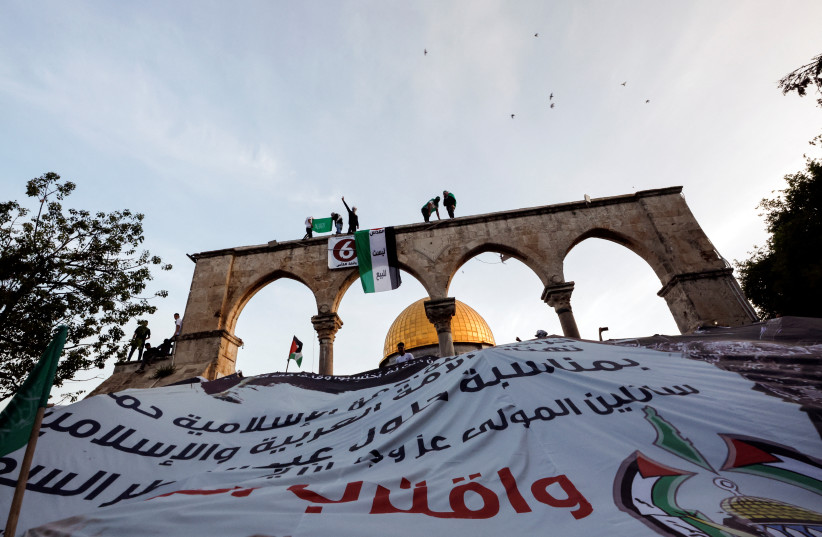Eid al-Fitr represents a state of comprehensive joy that pervades families in all Gulf countries, as Eid is both a social and religious occasion during which several religious rituals and other customs and traditions are performed. Eid rituals are similar in all GCC countries, with some differences due to the customs of the region or tribe to which a person belongs.
For more stories from The Media Line go to themedialine.org
On the morning of Eid day, Gulf citizens eat seven dates following the Sunnah of the Prophet Muhammad, then go to perform the Eid prayer collectively a quarter of an hour after sunrise, either inside the mosques or in open squares called the “Eid Chapel.” People from the Gulf countries, popularly known as Khaleejis, usually wear new clothes during Eid, which were tailored or bought specifically for this occasion, and they usually wear the Arab dress thawb, the ghutra and the headband, in addition to the bisht.
After completing the prayer, they congratulate each other, even if they do not know the person sitting next to them in prayer. After that, Eid visits begin in the GCC, usually to the homes of relatives or close friends. The Eidiya is considered one of the most important rituals that young people await. Adults usually offer money to children and young people, with the value of the gift varying according to the age of the child.
The Eid al-Fitr holiday extends for more than three days in Gulf countries. However, the first day is usually devoted to family visits, and some people visit the cemetery to read Surat al-Fatihah or pray for their deceased relatives. In Bahrain, Kuwait, and Qatar, the majlis or diwaniya, a large place to receive guests or events, is usually opened to guests and well-wishers on Eid al-Fitr. These majlises are a place for people to congratulate each other on Eid, during which sweets and bitter Arabic coffee are served.
In some regions of Saudi Arabia, neighbors gather on the morning of Eid, and each person brings a dish that was prepared in their home for a collective breakfast. In the Emirates, some details of the customs of celebrating Eid differ from one region to another, but all share the fact that it takes place with family or for the sons of the same tribe. In Bahrain, artillery fires eight shots on the morning of Eid to celebrate the holiday and announce the end of the blessed month of Ramadan.

Eating a group lunch among family is one of the common Gulf customs on the first day of Eid. Usually, it is a popular dish, whether it is majboos, biryani, mandi, or others, consisting of rice and meat with a different method of preparation and spices used. Eid preparations usually begin more than a month ago when men go to tailor the traditional Arab dress thawb, where there are long waiting lists at tailors. Women also tailor the popular galabiyas and abayas for Eid several months before.
Rulers of the GCC
The rulers of the GCC usually perform the Eid prayer among the people, with a limited number of invitees. After the prayer, congratulations are exchanged between the leaders and those invited on Eid. The sweets that are served on Eid differ from one Gulf country to another. Kuwait serves “Darabeel” and “Rahash” sweets, while Bahrain serves “Showaiter” sweets, and the Sultanate of Oman serves “Omani sweets.” Saudi Arabia, Qatar, and the UAE offer various kinds of sweets.
Dates remain the most important dessert that must be presented on Eid and placed in front of the guests.
Jassim Butabnia, the owner of a Bahraini Majliss, told The Media Line, “Gulf customs have evolved over time, but they are still within the same context.” He explained, “Eid lunch, for example, was previously limited to one popular dish, but now it may be a buffet system to satisfy all family members.”
Various celebrations and events usually begin on the second day of Eid when concerts, theatrical performances, festivals, and other events organized by each Gulf country are held. The actors are keen to present plays during the Eid holiday, as the turnout during this holiday is the highest compared to the rest of the year.
Abdullah Al-Awadi, a Kuwaiti citizen, told The Media Line, “We in Kuwait take care of all the details related to Eid, such as the famous Kuwaiti sweets, Arabic coffee, and even the Eid lunch.” He continued, “On the second and third days of the feast, we go out to celebrate or attend the special activities of the feast, or to meet with friends and others.”
“We in Kuwait take care of all the details related to Eid, such as the famous Kuwaiti sweets, Arabic coffee, and even the Eid lunch.”
Abdullah Al-Awadi
Basil Al-Rawi, an elderly Saudi, told The Media Line, “Eid in Riyadh is the most beautiful. Eid ceremonies start from prayer until late at night, and there are times allocated for neighbors, and others for family and friends.” He continued, “Unlike the rest of the Gulf countries, in Riyadh, special popular Saudi dishes are served, such as markook, matazeez, and others, which are not served in any other Gulf country.”
